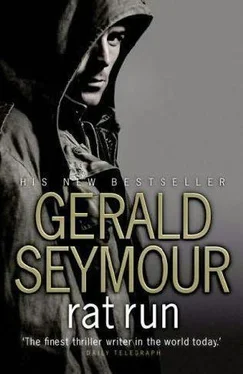Gerald Seymour - Rat Run
Здесь есть возможность читать онлайн «Gerald Seymour - Rat Run» весь текст электронной книги совершенно бесплатно (целиком полную версию без сокращений). В некоторых случаях можно слушать аудио, скачать через торрент в формате fb2 и присутствует краткое содержание. Жанр: Триллер, на английском языке. Описание произведения, (предисловие) а так же отзывы посетителей доступны на портале библиотеки ЛибКат.
- Название:Rat Run
- Автор:
- Жанр:
- Год:неизвестен
- ISBN:нет данных
- Рейтинг книги:4 / 5. Голосов: 1
-
Избранное:Добавить в избранное
- Отзывы:
-
Ваша оценка:
- 80
- 1
- 2
- 3
- 4
- 5
Rat Run: краткое содержание, описание и аннотация
Предлагаем к чтению аннотацию, описание, краткое содержание или предисловие (зависит от того, что написал сам автор книги «Rat Run»). Если вы не нашли необходимую информацию о книге — напишите в комментариях, мы постараемся отыскать её.
Rat Run — читать онлайн бесплатно полную книгу (весь текст) целиком
Ниже представлен текст книги, разбитый по страницам. Система сохранения места последней прочитанной страницы, позволяет с удобством читать онлайн бесплатно книгу «Rat Run», без необходимости каждый раз заново искать на чём Вы остановились. Поставьте закладку, и сможете в любой момент перейти на страницу, на которой закончили чтение.
Интервал:
Закладка:
He existed. Through the autumn his salvation had been the heavy, thudded knock of the big West Indian's fist on his door. Less often in the winter. Now he never came, as if Ivanhoe Manners's life had gone on, as if he had found new destitutes to throw his time at. Through Manners he had learned of the estate's pulsebeat. He could stand now at the back window of the unit and look down on the square below, where the kids' playground apparatus was broken, where the grass was worn away, where many windows had plywood hammered over them, where graffiti were spray-painted on the walls, and watch the rule of the youth gangs. Some days he would unlock the door, draw down the bolt and go out on to the walkway to stare across the estate's inner roads, but only when he knew the door behind him was open and there for fast retreat, the key in the door for turning.
In the early days of life on the Amersham, Manners had come, thrown the charity-shop overcoat at him and made him walk, had bullied him as if that were the therapy he required.
So, Malachy knew where the crack-houses were on the estate; ground-floor units with heavy bars on the windows and steel plates on the inside of the doors where rocks of cocaine were sold and consumed.
'Fortresses, man. They seem to know when the police are coming and can spot the surveillance. They have a nose for the raid that's on its way, and nothing's ever found.'
He knew where the vagrants lived, in which dis-used garages they slept. He recognized some from the pitches where they begged in the underpass at the Elephant and Castle.
'You'll know this yourself, Malachy. You're in the underpass and we'll say that four hundred people pass you in an hour, four thousand in a ten-hour begging shift, and fifty people drop a pound coin in your cap in the ten hours and think it's for dog food, or for your cup of tea. Fifty pounds in a day, that's good work, and good people have massaged their consciences as they hurry by. And you'll know that dossers empty the cap so often because it's bad for trade if people see what's actually given them. It's all for drugs, and the dog goes hungry.'
Ivanhoe Manners had walked him round the worst dark corners of the estate, where he was safe only because he had the massive prize-fighter build of the social worker with him, where the ceiling lights of the inner tunnels were smashed, where the one-time shopping arcades were wrecked, scorched – where the vagrants hunted.
'They need wraps of "brown". They have to jack up at least every twenty-four hours. You know that, you've seen it when you were under the cardboard.
They're scum when they're on heroin. The brown destroys them. They'll steal from their only friend to get the hit, think nothing of stealing from family. They inject, and they chuck the syringes away even when there's a council-provided needle exchange – and kids find them. They got hepatitis A or B or C. They got tuberculosis, they're going to get thrombosis. They thieve – anything they can sell on, but best is a purse or a wallet. The cops all wear stab-proof vests because a used needle is a weapon for the vagrants. They are dangerous, and don't ever forget it, and you go carefully when it's dark on the Amersham.'
Back in the autumn, Ivanhoe Manners had walked him by the shoebox-shaped flat-roofed public toilets.
'They had to close them, the council did. A pensioner, male, goes inside, and a girl follows him.
She's offering a blow for fifty pence. He's in the cubicle, panting, gasping, she's doing it. What else is she doing? Doesn't need her hands for a blow, her hands are on his wallet, inside his coat. She's got it, she's off and running, and his trousers and his pants are down round his ankles. He's too embarrassed, poor sod, to come charging out and chase her – if he could. The council closed the toilets.'
And after they'd done their walking, Ivanhoe Manners would come back with him to flat thirteen on level three and they'd use the chess set that the social worker had given him. And with the chess games came the monologues that Malachy seldom interrupted.
'This is where the real war is, a war worth fighting.
I never been to Afghanistan and I'm not going to Iraq.
But they don't seem to me as places that matter, not to me. Maybe, just possible, we can win a war in Afghanistan or in Iraq, but sure as hell we're losing the war at our doorstep. You go up to the top of block nine and look all around you. From that roof, you'll see wealth and power and Parliament, you'll see where all the big people make their money. You'll see the City – banks and insurance, you'll see the ministries, fat cats running your life – but if you look down by your feet, you'll see where the war is. The Amersham is a dump ground for dysfunctionals. You shouldn't be here, Malachy. No, you shouldn't.'
It was seven weeks now since Ivanhoe Manners had last called by.
Days slipped away in which Malachy went nowhere, spoke to no one. What drove him from flat thirteen most often was that the fridge was empty – no bread, no milk, no coffee, no meals for one. But every fourteen days, regular, the first and third Thursday of each month, he was invited next door for tea.
That Thursday morning, Malachy Kitchen dressed in the best of the clothes bought for him at the charity shop seven months earlier, kicked off the trainers and wiped the brogues with a cloth so that their old brightness returned. He would while away the hours, lost in thoughts and pitying himself, till he heard the faint knock on the common wall. He had little else to live for.
He washed himself. In the shower, piping-hot water cascaded down on him. Ricky Capel always had the lever turned high in the hot sector when he sluiced his body, always washed well, and the suds of liquid soap rolled from his face and chest and down his groin. His short dark hair plastered his scalp. Joanne never had the shower water turned that high: it scalded his skin, reddened it, but he had no fear of pain. Each time he took a shower, it was as if he needed to test his ability to withstand pain… That morning he had seen pain, another man's, and it mattered little to him. Above the shower's hiss, he heard Joanne's shout: when was he going to be ready? He did not answer. He would be ready when he cared to be ready.
The overalls he had worn that morning, and
Davey's, had gone into the petrol drum at the back of the warehouse, where the fire was lit so that no trace of his visit to the cavernous, derelict unit remained.
But he always washed afterwards, and so thoroughly, because he knew of the skills of the forensic experts.
With a towel loose round him and water dripping down, he stood in front of the full-length mirror beside the cubicle. He glowed and that brought a smirk to his rounded, child-like face. No one, not any of them in his circle, would have dared to suggest it was a baby's face, but it was untouched by lines of worry, anxiety, stress. Self-respect was everything to Ricky Capel, and respect was what he demanded. He had burned his overalls because a man had denied him respect. The man who had made that mistake was now on the road south of the capital and heading for the coast.
He was thirty-four years old, though his complexion put him younger. He had married Joanne in 1996, and had the one child – Wayne. One of the few decisions he had allowed her was to give him that name. The boy was now seven and an overfed lump, without his father's sleek stomach line. The man who'd denied him respect was the eighth to have died under the supervision of Ricky Capel. At that young age, he controlled an area of the capital running from Bermondsey and Woolwich in the north, Eltham in the east, Catford in the south and Lambeth in the west.
Inside that box he had authority over all matters of business he chased after. But, on Benji's advice, he had gone into the City of London at the start of the year.
Читать дальшеИнтервал:
Закладка:
Похожие книги на «Rat Run»
Представляем Вашему вниманию похожие книги на «Rat Run» списком для выбора. Мы отобрали схожую по названию и смыслу литературу в надежде предоставить читателям больше вариантов отыскать новые, интересные, ещё непрочитанные произведения.
Обсуждение, отзывы о книге «Rat Run» и просто собственные мнения читателей. Оставьте ваши комментарии, напишите, что Вы думаете о произведении, его смысле или главных героях. Укажите что конкретно понравилось, а что нет, и почему Вы так считаете.












